Which Film Should Win Best Picture 2017?
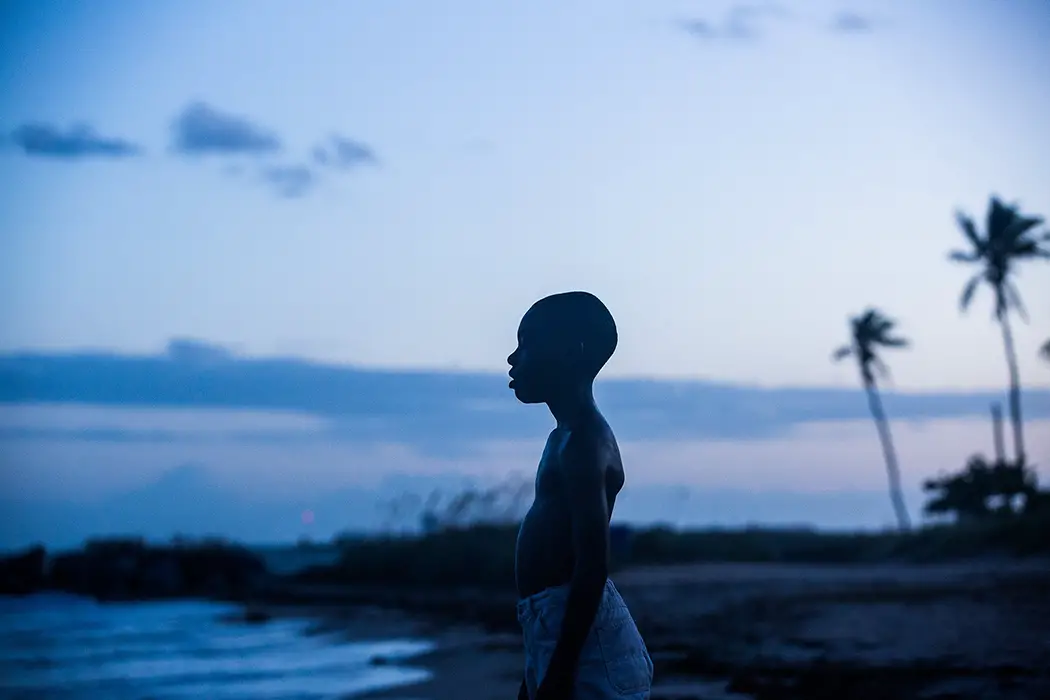
It took me a while to discover the wonderful world…
This year’s selection of movies nominated for the Best Picture Oscar are a dazzling, varied group. There’s singing and dancing, aliens (though unfortunately not singing and dancing aliens!), coming-of -age stories and films about grief. After last year’s #oscarssowhite controversy, the 2017 nominees are also more diverse than 2016’s, with more of the films telling stories of people whose lives we don’t see often enough on the big screen.
I put out a call to the Film Inquiry writers, asking for someone to argue for each of the nominees why it should be the film to take home the Academy Award for Best Picture 2017. Here is what they said…
La La Land – Daryl MacDonald
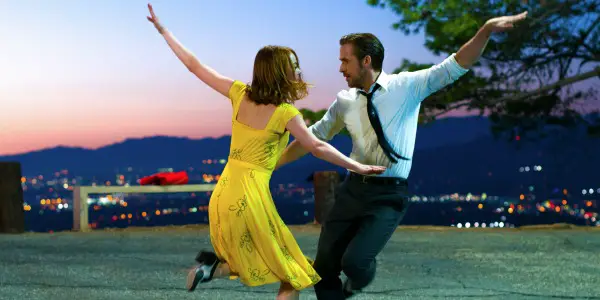
It was almost inevitable that the Academy would nominate a film that is, in many ways, a paean to Old Hollywood. Not just a film set in LA about a would-be movie star chasing her dreams, La La Land also harkens back to the golden-hued era of big musical numbers and choreography that were the remit of classics such as Singin’ in the Rain and The Sound of Music. It’s perfect foil for the Academy, like meeting your old friends at the bar and reminiscing about the good old days.
This is not to say La La Land doesn’t deserve the success currently being heaped upon it; in fact, it could be argued it deserves the success in spite of that. Much is made, this time of year, of the Oscar bait film. A great deal of the time it’s politically motivated (think of the #OscarsSoWhite controversy last year, and contrast it with the record-breaking number of black nominations this year), and it’s easy to shrug off some of the Academy’s nominations as typical because of this.
So when La La Land was picking up Oscar buzz, it wasn’t difficult to be cynical and assume it was the Academy patting itself on the back. Yet from the very first sequence featuring a musical number on a busy LA Freeway (no wonder the congestion in that city is so bad, if everyone spends their time singing and dancing!) to the virtuoso finale that, if you haven’t seen it, will stun you with its inventive cinematography and beautifully nuanced set design, La La Land pulls you into its dreamy hope-filled world with ease. Although Ryan Gosling is neither the best dancer nor singer, his natural charisma and the chemistry he shares with Emma Stone (they’ve now done three films together, and the chemistry in all three is clear to see) make it easy to overlook these minor facts.
The music, also, is a thing of beauty; reprising throughout the movie, at times wrapped in context – for example Sebastian frequently plays Mia & Sebastian’s Theme wherever he appears to be wistfully considering the balance between his love for her and his dreams – it soars at the right moments and lends weight to what is an admittedly thin and at times clichéd story. There isn’t a moment in the movie that feels like it drags; rather, it lifts you into the air from the first beat and carries you with it until, exhilarated and exhausted, you’re set back down to catch your breath.
If there is one thing Oscar movies (lately anyway) tend to share in common, it’s the weighty, sometimes difficult subject matter. The Academy is quite famous for it. In La La Land we have a genuine, bursting-with-joy musical celebrating the dreamers and the city of dreams itself. Combine that with several sublime musical numbers, stunning set pieces, sizzling chemistry between its leads, and a few tear-shedding moments, and you’ve got everything the Academy wants in a movie. La La Land is that rare overly-hyped Oscar buzz film that really, truly deserves the plaudits, and given its record-equaling fourteen nominations, don’t be surprised if you see it steal the show this year.
Arrival – Akemi Aiello
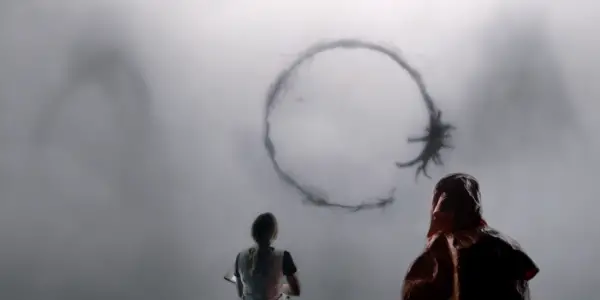
Arrival’s nomination for Best Picture seems to be a continuation of the trend of science fiction films. However, it offers much more than past competitors. Gravity, Interstellar, and The Martian were considered because they offered a new spin on typical story-lines by placing them in space, not offering much more than their visual effects. Arrival speaks more about humanity and leaves you with existential questions to ponder beyond your theater seats.
Amy Adams is incredible as Professor Louise Banks, acting as the perfect vessel to enter and experience this unique world. Though Denis Villeneuve’s imagination and grandiose vision is essential, the story’s impact would not be able to succeed without Adams’ performance.
On the technical side, it is a masterpiece of sound construction. Often sound is thought to enhance the visual of the films, however, in Arrival it is the opposite. The sound brings you in and grounds you in the world, while your emotions are guided by Jóhann Jóhannsson’s perfectly eerie and elegant score. Together paired with Bradford Young’s ethereal and gorgeous cinematography, it gives the film an interesting balance of fear and hope. The creation of UFOs and the Heptapods are done in a completely new way, with a taste of modernism that promotes the film’s realism. From the widest shots to the smallest details, a new precedent in craftsmanship and artistry is made.
Arrival is entirely different from its competitors this year. It gives more with every viewing, making it one of the few films that will be talked about past this awards season.
Lion – Stephanie Archer

When I think about who should win Best Picture, my thoughts immediately travel to how a film made me feel – it’s why filmmakers do what they do, isn’t it? Looking at this year’s nominees, they all had the potential to evoke some sort of emotion from their audiences. One film in particular, however, stood out more than the others, bringing the catharsis of film to its best. Lion, while quietly debuting in theaters this past year, drew out a vast array of emotions from viewers – and that left people hopeful and willing to take action for a cause that had been unknown by many for years.
Lion follows the story of a young child named Saroo who became lost 1,600 miles from his home. Unable to speak the language, Bengali, he is left at the mercy of those around him in a country that has few resources to help the many lost and orphaned children of India. Saroo, however, is one of the lucky ones. He is adopted by a loving couple from Australia and given every chance and opportunity they can afford him. Finding success as an adult, Saroo begins to feel the emptiness, guilt, and despair for the family he had lost years ago. Plummeting into depression and obsession – believing they have never once stopped looking for him, Sarooo begins a journey to find his childhood home – and his family.
All around, Lion is a success – all elements working cohesively to present the most accurate and heartfelt representation of loss and hope. Emotions are heightened as the soundtrack accompanies each tense and heartfelt moment of the film. Sunny Pawar, who plays young Saroo, steals the show – and our hearts – and is paired perfectly with his adult counterpart, played by Dev Patel. Yet, with all the technicalities aside, this is a film that should win because it had a heart of truth. While depicting the story of young Saroo, India’s long standing issue of the children lost and orphaned throughout their country was brought face-to-face with viewers. This truth concerning the youth of a country and a true story of a boy who found his way home are the perfect pairing to garner this film the Best Picture award.
Manchester By The Sea – Chloe Walker

If Manchester By The Sea were to win the Academy Award for Best Picture, as I believe it should, it would go down in history as one of the most low-key, subtle films ever to get that golden statue. Subtlety is not a virtue rewarded often by the Academy; a body that typically favours films with big speeches, heroic overcoming of disabilities, or love letters to cinema.
Manchester By The Sea contains none of these things. As a colleague of mine astutely put, it’s an articulate film about inarticulate people. Casey Affleck plays Lee, a janitor who suddenly becomes a guardian to his nephew (Lucas Hedges) after the untimely death of his brother (Kyle Chandler). Lee is a polite, but taciturn man, who is not one to engage in small talk. His reticence to engage with people is the result of a devastating past; when the truth emerges, in an operatic but wordless sequence, it’s an emotional punch in the gut.
Casey Affleck‘s beautifully measured performance is just one example of the smorgasbord of brilliant acting on show here. The relatively unknown Lucas Hedges makes Patrick a completely believable, grieving, mixed-up teenager. The ever reliable Michelle Williams gives a memorable turn as a woman struggling with unimaginable grief and wrestling with the idea of forgiveness. Gretchen Mol, only featured in a few scenes, also makes a memorable impact.
Kenneth Lonergan makes countless great directorial decisions. Keeping the film’s most emotional sequences free of dialogue is a brave idea that pays off wonderfully. At these moments of extreme trauma, words can’t say as much as actions. Lonergan knows he has a fantastic cast, and trusts them implicitly.
It’s the way he keeps a handle on the potentially tricky tone that counts this as his most impressive achievement. This film is full of pain, yet there are plenty of laugh out loud moments. Rather than sit awkwardly together, the humour and the heartbreak combine to create a film that feels like you’re watching real people, just doing their best. Its special brand of ordinariness is what makes Manchester By The Sea a breath of fresh air.
Moonlight – Dave Fontana
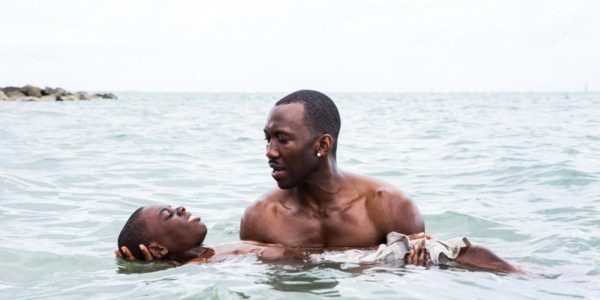
Moonlight is a film that, perhaps more than any other nominee, deserves to be recognized at this year’s Academy Awards. It not only concerns certain walks of life that are little-reflected in major films, such as the focus on African-American communities and on a gay man, but it also delves into the very relatable theme of what it means to find one’s identity in a hostile world.
Moonlight focuses on three distinct periods in the life of a boy named Chiron, shown when he is a young kid, a teenager, and finally an adult. Chance interactions and significant events affect him at each period, subsequently leading to an outcome that changes who he is to the world by the next time we see him. Barry Jenkins, who reportedly worked on this film for 8 years, films Moonlight through Chiron’s uniquely distraught persona, often using shaky cameras and naturalized dialogue to ground the film in real life. The film’s use of beautiful imagery and ethereal colors is also incredibly effective, especially during the moonlight scene from which the film gets its name.
Acting-wise, Moonlight is bursting with talent, from the three actors that play Chiron (Alex Hibbert, Ashton Sanders, Trevante Rhodes), to short-but-powerful supporting performances. Mahershala Ali, playing a fatherlike figure to Chiron, is a particular standout, giving the role a warm sensitivity despite his brash outward demeanor. Naomie Harris also gives a devastating performance as Chiron’s mother, who, though often despicably negligent towards him, still clearly possesses all the love of a mother for her son.
Overall, Moonlight is the type of film that, though little-celebrated at the Oscars due to its uncomfortable subject manner and distinctive manner of filming, deserves to be recognized for the near-masterpiece that it is. It likely won’t happen at this year’s ceremony, but I’m crossing my fingers all the same.
Hell Or High Water – Jo Bradley
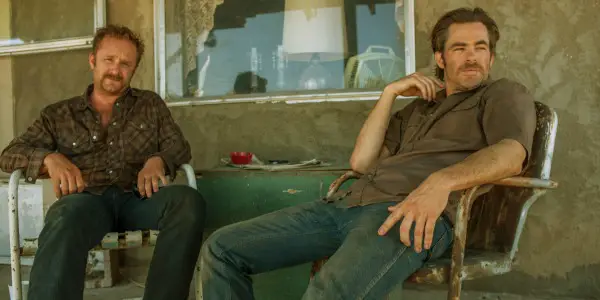
Hell or High Water should win Best Motion Picture for many reasons: its excellent performances, stunning cinematography, and a plot that’s simultaneously funny, entertaining, and affecting. But one of the most compelling cases for it to win Best Picture is the painfully relevant narrative. The little guys (brothers, played by Chris Pine and Ben Foster) standing up to the big guys (greedy, apathetic bankers), in a story that thrillingly captures and reinstates the power and wealth disparity of America.
Tonally, Hell or High Water is a fusion of crime caper and road movie. It’s Thelma and Louise meets No Country for Old Men with a splash of Blues Brothers. Two brothers, part of the white trash underbelly of American society, rob a chain of banks, hunted by gruff yet canny retiring Texas Ranger (Jeff Bridges, who is Oscar-nominated for his performance).
Director David Mackenzie artfully explores the economic desperation that prompted Trump’s astounding election, potentially making this one of the most relevant films of 2016. Pine’s morally steadfast Toby adds complexity to the deplorable criminal trope. His heartfelt interactions with Foster’s wild ex-con prevent us from demonising these likeable fugitives. The characters aren’t black and white, and no one is innocent here. Nonetheless, Mackenzie firmly angles the audience to side with the charismatic criminals.
Nuttgen’s cinematography artfully captures the arid Texan landscape. Mackenzie sustains tension throughout, merging black comedy with fraternal chemistry to provoke reflection on the complex nature of criminal morality. Hell or High Water isn’t the most likely winner, however, it’s a poignant story that’s compelling, enthralling and empathy-provoking. And for that, I wouldn’t pick any other film.
Hacksaw Ridge – Matthias van der Roest
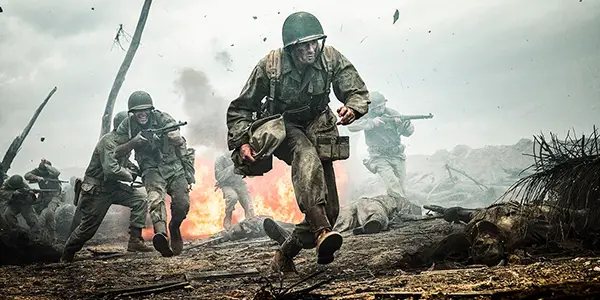
Hacksaw Ridge tells the story of Desmond Doss (Andrew Garfield). Doss was the first conscientious objector to receive the Medal of Honor for his services in the Pacific theatre during the Second World War. Doss wanted to serve as a medic because his religion did not permit him to carry a gun. Naturally this attitude causes some to be suspicious of him, but once a military court decides in his favour, he’s off to war as a medic.
Once the 77th Infantry Division gets to Japan, things get bloody very quickly, and as this is a Mel Gibson film, bloody means really bloody. The rest of the film shows his bravery in the face of grotesque violence and his heroism under fire.
This film should win Best Picture because the story is amazing, the acting possibly even better (even Sam Worthington is good in it). The war scenes are appropriately harrowing, much like the cinematography and the music. In total, the film has received six nominations at the Academy Awards this year, which puts it among one of the most nominated films. This is a good omen, just like the fact that it was picked as one of the 10 films of the year by the American Film Institute.
Much has been made of the multiple controversies surrounding Hacksaw Ridge’s director, Mel Gibson, so the fact that this film has done as well as it has, critically and commercially, suggests people are ready to let the past be the past and possibly give this film the award for Best Picture. If so, this would be Gibson’s second Best Picture win after his first for Braveheart in 1996.
Hidden Figures – McKenna Lumley
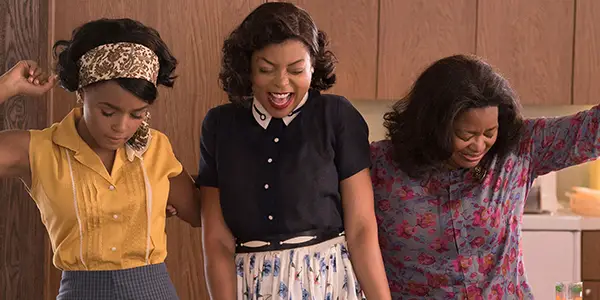
Hidden Figures is the real tale of three incredible and brilliant women who were instrumental in the Space Race of the 1960’s. It is now the top grossing film of the Best Picture nominees, passing the favorite La La Land, with over $119.3 million in North America. It passed even Rogue One‘s opening weekend while only playing in half the amount of theaters. America is hungry for these types of diverse stories, and Hidden Figures is a stunning, Oscar-worthy, example.
The story follows three women, Katherine G. Johnson, Dorothy Vaughan, and Mary Jackson (Taraji P. Henson, Octavia Spencer, and Janelle Monae, respectively), who are employed by NASA as human computers. All three are superb mathematicians with high aspirations: Jackson petitions the court to become the first African American female engineer, Vaughan teaches herself computer code to make herself and her team indispensable to NASA, and Johnson works to calculate trajectories and navigational charts and check computer calculations when they were implemented.
Hidden Figures is the type of narrative that we need right now. It’s empowering and heartfelt and real. It deserves an Oscar, like these women deserved to be recognized. It’s a bright spot in this patch of darkness. It’s the North Star leading us forward.
This film revolves around women, specifically black women, and the contributions they’ve made and will continue to make. Any little girl watching will know she can become anything she wants to, no matter who or what stands in her way. And those little girls are our future. This film impacts young people and old people alike because there is always something to be learned from history and the people who made it. These are the stories we need to survive, to persist, to climb higher than we’ve ever gone before, and Hidden Figures deserves to be recognized for that.
Fences – Ryan Morris
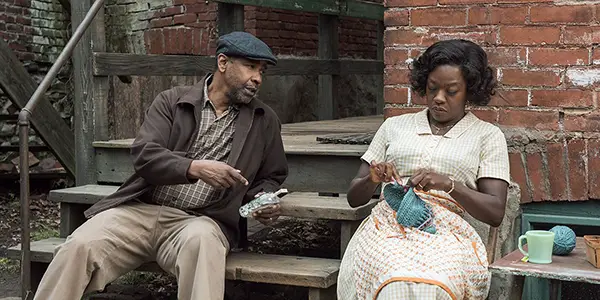
Fences is the kind of film that could have drifted through cinemas relatively unnoticed. It could have made no fuss, not caught anyone’s eye, and just faded away. But it didn’t. It kicked up a storm, it got people talking, and it made sure people knew what it was. A film called Fences. Fences.
On paper, it sounds like nothing at all. A man puts up a fence around his house and we watch his family as he does so. Yet, Denzel Washington turns this story into something notably cinematic, and something the Academy should not ignore. We all know Viola Davis is walking away with a trophy for her sensational work here come the 26th, but is Fences itself worthy of the top prize? I would argue so.
This isn’t just a strong film, it’s an important one, and the way in which it tackles its importance is notable. It’s easy to get caught up in the way Moonlight handles minority figures (as masterfully as it does so), but Fences has the added challenge of taking a period setting and making its race and gender issues matter in connection to today’s society. With everyone else going on in the world at the moment, this film really couldn’t have released at a more poignant time.
Fences relies on racial issues, but never lets its characters be defined by it. Viola Davis, in a performance that could shatter the Richter scale, portrays Rose as a woman caught up in a world driven by men, yet the film finds her a path through this – it connects with audiences today even despite the 60 years that has passed since the film’s setting.
Fences is not a perfect film – neither are any of the other eight films up for this award – but it’s an important one, and one that should be bestowed the top prize at this year’s Oscars. It may be small and intimate in scale, but the words it unleashes and the thought it provokes are bigger than anything else you’ll find in the Dolby Theatre on the 26th February. Did I mention how good Viola Davis was?
Now you’ve read our arguments, hopefully you’d agree that even the underdog movies here would be worthy of taking home the trophy. But there can only be one winner, and the choice is hard.
So which film are you rooting for?
Does content like this matter to you?
Become a Member and support film journalism. Unlock access to all of Film Inquiry`s great articles. Join a community of like-minded readers who are passionate about cinema - get access to our private members Network, give back to independent filmmakers, and more.
It took me a while to discover the wonderful world of cinema, but once I did, everything just fell into place.











